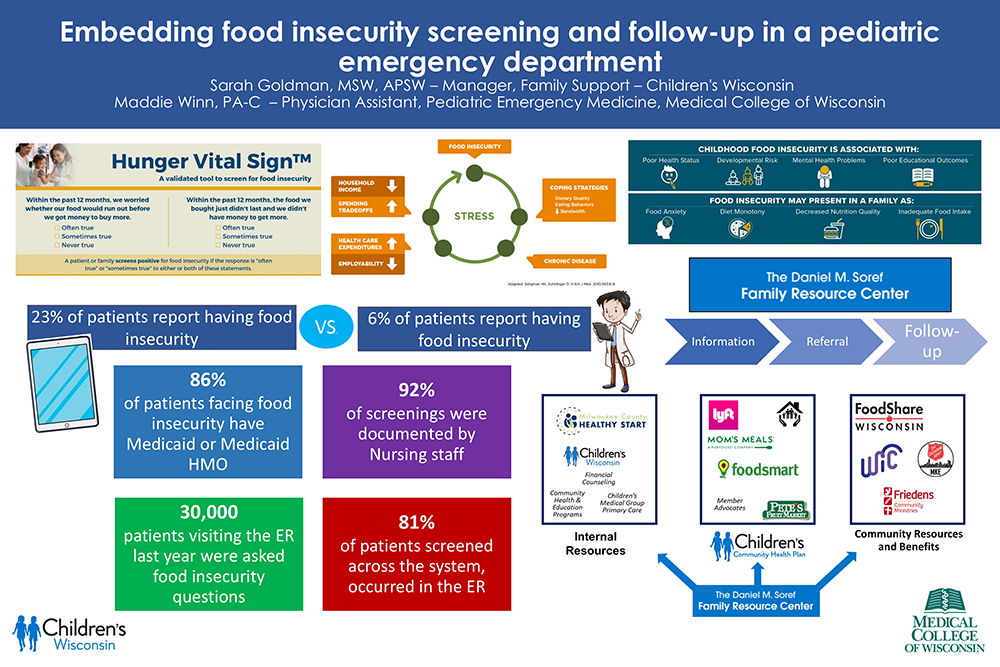Children's Wisconsin, 2024 Quality
Food Insecurity Screening and Intervention in a Level 1 Pediatric Emergency Department Trauma Center
Local research revealed that up to 50% of children visiting the Children’s Wisconsin emergency department (ED) experience food insecurity. Emergency medicine providers saw firsthand how this impacted the overall health outcomes of patients and families. In 2020, ED provider leaders advocated for the implementation of food insecurity screening as a standard of care. This grassroots effort led to a partnership with the Children’s Health Management team and the Daniel M. Soref Family Resource Center, transforming the initiative into a comprehensive care model.
Currently, families are screened using the national standard Hunger Vital Sign questions, with results documented in the electronic health record. If food insecurity is identified, electronic decision support prompts the nursing team to provide a $15 cafeteria gift card to the family. This is processed as an “order” that disappears once marked as “completed.” The gift cards not only provide immediate support but also help build trust with the family. Envelopes containing the cards include a QR code linking to a resource page with local food and benefits navigation resources.
Since the program's inception, screening rates have varied between 30-60%, resulting in 24,000-48,000 screened families per year in an ED that sees almost 80,000 patients annually. For families identified with food insecurity, the Daniel M. Soref Family Resource Center team attempts to contact them within 72 hours of their ED visit. This team uses a nationally validated information and referral model to address a family’s holistic needs.
Food-insecure families receive assistance with understanding and navigating their FoodShare and WIC benefits or connecting with local food pantries. Additionally, they are supported in re-engaging with a primary care medical home, obtaining utility assistance, navigating housing issues, or managing their medical needs. The Daniel M. Soref Family Resource Center team has successfully connected with 70% of families after their visit. A follow-up visit six weeks later helps assess if the provided resources and referrals had a meaningful impact on the families' situations.

Currently, families are screened using the national standard Hunger Vital Sign questions, with results documented in the electronic health record. If food insecurity is identified, electronic decision support prompts the nursing team to provide a $15 cafeteria gift card to the family. This is processed as an “order” that disappears once marked as “completed.” The gift cards not only provide immediate support but also help build trust with the family. Envelopes containing the cards include a QR code linking to a resource page with local food and benefits navigation resources.
Since the program's inception, screening rates have varied between 30-60%, resulting in 24,000-48,000 screened families per year in an ED that sees almost 80,000 patients annually. For families identified with food insecurity, the Daniel M. Soref Family Resource Center team attempts to contact them within 72 hours of their ED visit. This team uses a nationally validated information and referral model to address a family’s holistic needs.
Food-insecure families receive assistance with understanding and navigating their FoodShare and WIC benefits or connecting with local food pantries. Additionally, they are supported in re-engaging with a primary care medical home, obtaining utility assistance, navigating housing issues, or managing their medical needs. The Daniel M. Soref Family Resource Center team has successfully connected with 70% of families after their visit. A follow-up visit six weeks later helps assess if the provided resources and referrals had a meaningful impact on the families' situations.


